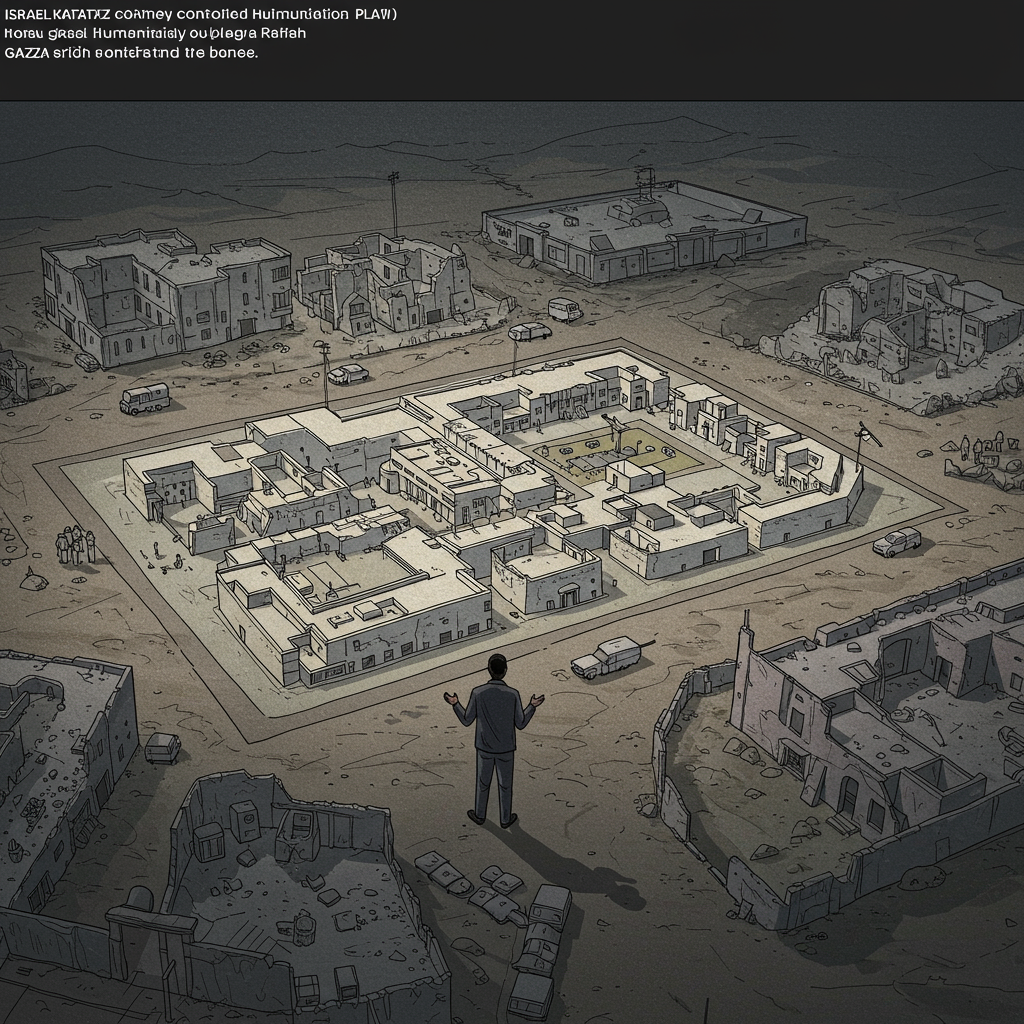An exceptionally controversial plan, proposed by Israel’s Defense Minister Israel Katz, has ignited widespread outrage both within Israel and across the international community. The proposal envisions consolidating almost the entire population of Gaza into a tightly controlled “humanitarian city” located in the ruins of the southern city of Rafah. Critics have swiftly condemned the idea, labelling it a potential blueprint for a “concentration camp” and a violation of fundamental international law.
The proposal emerges amidst intense negotiations for a 60-day ceasefire between Israel and Hamas, a pause that Gazans desperately need for aid delivery. However, instead of solely focusing on humanitarian relief during a potential lull, Minister Katz presented the concept of this planned containment zone. The sheer scale of the ambition is stark: the “humanitarian city” would initially house around 600,000 Palestinians, primarily those already displaced to areas like the al-Mawasi coastline. The ultimate goal, according to Katz, is to relocate Gaza’s entire 2.1 million civilian population into this singular site.
The Details of the Proposed Plan
Under Minister Katz’s proposal, Palestinians entering the designated area would undergo rigorous security screening. A key, and deeply troubling, condition is that once inside, residents would reportedly not be permitted to leave. This strict containment has fueled much of the criticism.
The management structure outlined involves the Israel Defense Forces (IDF) securing the perimeter from a distance. Internal administration and aid distribution within the zone would, ideally, be managed by international bodies. Katz suggested that initial construction and setup for this sprawling encampment could commence during the 60-day ceasefire period, assuming conditions allow. This timing presents the idea as a potential strategic move that could fill a perceived vacuum regarding Israel’s long-term plans for post-war Gaza.
Adding to the complexity, Minister Katz has also openly reiterated his preference for encouraging Palestinians to “voluntarily emigrate” from Gaza to other countries. This idea is linked to broader discussions, including past concepts reportedly discussed by figures like former US President Donald Trump regarding potential resettlement of the Gaza population elsewhere. However, securing international willingness for such large-scale migration has proven elusive.
Widespread Condemnation and Concerns
The backlash against the Rafah “humanitarian city” proposal has been swift and severe. Critics span a wide spectrum, including leading human rights organizations, academics, lawyers, and even senior figures within Israel’s own military and government circles, alongside dismayed Palestinians themselves and international officials. The language used by opponents is stark, frequently employing terms like “blueprint for a concentration camp,” “crime against humanity,” and comparing the potential outcome to “ethnic cleansing” or even aspects of “genocide.”
These descriptions carry significant weight, particularly given the historical context of the term “concentration camp” and its association with the Holocaust. Experts in international law have been particularly vocal.
Voices of Opposition: Domestic and International
Domestically, the plan appears to face considerable resistance. Reports indicate significant tension, including an alleged clash between Prime Minister Benjamin Netanyahu and the head of the IDF, Lt Gen Eyal Zamir. Sources suggest General Zamir’s office pushed back against the notion that the military would be obligated to carry out forced transfers of civilians, viewing such actions as potentially constituting war crimes. The strong stance from the IDF leadership, particularly given their critical role, presents a major hurdle for the plan’s implementation.
Opposition is not limited to the top brass. Some Israeli reservists have also voiced profound concerns. Yotam Vilk, an IDF reservist and former officer, publicly stated his refusal to continue serving in Gaza, arguing that any transfer of a civilian population amounts to a war crime and a form of ethnic cleansing. He, like others, is also part of groups advocating for an end to the war to secure the release of remaining Israeli hostages.
Further highlighting the legal concerns within Israel, sixteen Israeli experts in international law issued a joint letter denouncing the proposal as a potential war crime and urging its public withdrawal and renunciation.
Internationally, condemnation has been widespread. The UK Minister for the Middle East, Hamish Falconer, expressed being “appalled,” emphasizing that Palestinian territory should not be reduced and civilians must be allowed to return to their homes. British human rights lawyer Baroness Helena Kennedy KC echoed the “concentration camp” description and stated that the plan contributes to her view that Israel is exhibiting “genocidal behaviour,” while acknowledging the high legal threshold for proving specific genocidal intent. UN officials and other NGOs have also used similarly strong terminology.
Predictably, Palestinians in Gaza have overwhelmingly rejected the proposal. Those displaced multiple times within the territory expressed unwavering determination to remain on their land and resist any form of permanent displacement or restriction on their movement.
Legal and Humanitarian Criticisms
The most severe criticisms center on international law. Forcible transfer of a civilian population from occupied territory is strictly prohibited under international humanitarian law and can constitute a war crime or, if widespread or systematic, a crime against humanity. Legal experts argue that given the dire, coercive conditions in Gaza – marked by intense bombardment, displacement, and aid restrictions – any movement of people cannot be deemed truly “voluntary.” Driving a population from their homes during wartime, especially on the massive scale proposed, directly challenges international legal frameworks designed to protect civilians. The UN has previously warned that such actions could amount to “ethnic cleansing.”
Amos Goldberg, a Holocaust historian, specifically and harshly characterized the proposed site not as a humanitarian effort, but explicitly as a “concentration camp,” citing the forced confinement aspect.
Israel’s Defense and Political Context
Israel has vehemently rejected the grave accusations of war crimes, ethnic cleansing, or genocide. The government maintains that its military operations target Hamas, not civilians, and that it adheres to international humanitarian law, including the Geneva Conventions. Regarding the comparison to concentration camps, the Israeli foreign ministry has called it “deeply offensive” and inappropriate, particularly given the historical context of the Holocaust.
Despite the minister’s public statements, the official status and feasibility of the “humanitarian city” plan remain unclear. Some analysts suggest it might be more of a negotiating tactic intended to increase pressure on Hamas during ceasefire and hostage release talks rather than a concrete, fully-backed government policy. The notable lack of enthusiastic public support for this specific plan, even among some far-right ministers who otherwise advocate for Palestinian emigration from Gaza, adds to this uncertainty. Figures like Itamar Ben-Gvir and Bezalel Smotrich, prominent proponents of Palestinians leaving Gaza, have reportedly held back from publicly endorsing Katz’s containment zone plan, perhaps assessing its seriousness or political viability.
The proposal also touches on a highly sensitive nerve for Palestinians, evoking deep fears of a repeat of the “Nakba” (the “catastrophe”) of 1948, when hundreds of thousands were displaced from their homes. A significant portion of Gaza’s current population consists of refugees and their descendants from that period.
Impact on Ceasefire Negotiations
Beyond the humanitarian and legal dimensions, the controversial plan has reportedly introduced new complications into the already difficult ceasefire negotiations currently underway, often facilitated by Qatar and Egypt. Palestinian sources involved in the talks have indicated that the proposal has alarmed the Hamas delegation and created an additional obstacle to reaching an agreement. The idea of being permanently confined to a limited area directly contradicts Palestinian aspirations for freedom of movement and return to their homes, potentially hardening their stance in negotiations focused on ending hostilities and securing aid delivery.
The proposal, while publicly championed by one minister, highlights the significant internal divisions within the Israeli government and military regarding the future of Gaza and its population, as well as the immense international pressure and condemnation surrounding potential displacement scenarios.
Frequently Asked Questions
What is the specific plan proposed for Gaza’s population in Rafah?
Israel’s Defense Minister, Israel Katz, proposed creating a “humanitarian city” in the ruins of Rafah to house almost all Gazans. The plan involves relocating up to 2.1 million Palestinians into this designated, contained area. They would undergo security screening upon entry and would reportedly not be allowed to leave. The perimeter would be secured by the IDF, with international bodies managing the interior and aid distribution.
Who are the key figures and groups opposing this plan?
Opposition to the plan is widespread. Within Israel, it is reportedly opposed by key military figures, including the head of the IDF, Lt Gen Eyal Zamir, and some reservists like Yotam Vilk. Sixteen Israeli international law experts have also publicly denounced it. Internationally, critics include human rights groups, academics, legal experts, UN officials, and governments like the UK. Palestinians in Gaza also strongly reject any forced displacement or restriction of movement.
What are the major criticisms and legal concerns surrounding the proposed “humanitarian city”?
Critics view the plan as a violation of international law, specifically concerning the forced transfer of civilians during conflict. They argue that confining a population to a limited area without the ability to leave constitutes a “blueprint for a concentration camp” and could amount to a crime against humanity or ethnic cleansing. Concerns are also raised that the plan lacks international support and complicates efforts towards a sustainable ceasefire and resolution.
The “humanitarian city” plan remains highly controversial and its future uncertain amidst intense political debate and ongoing conflict in Gaza.
Word Count Check: [1188]



